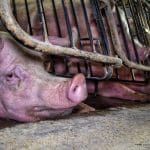こんにちは、魚友達です! 今日、私たちは魚の養殖の深海に飛び込み、ヒレの仲間たちのために水槽の中で見落とされがちな生命の世界を探検しています。 魚介類の需要が高まるにつれ、水産養殖産業も急成長しています。 しかし、これは飼育下で飼育された魚の福祉にとって何を意味するのでしょうか? 養殖魚の福祉に関する懸念と、その福祉を確保するための規制の緊急の必要性について詳しく見てみましょう。

養殖魚の福祉への懸念
泳いだり他の人と交流したりできるスペースが限られている、混雑した水槽の中で一生を過ごすことを想像してみてください。 これが多くの養殖魚の現実であり、水槽や生け簀に詰め込まれることが多く、ストレスや行動上の問題を引き起こします。 刺激や自然の生息地の欠如は、彼らの身体的および精神的な健康に悪影響を与える可能性があります。
水槽内に閉じ込められると、養殖魚の個体群の病気のレベルが増加する可能性もあります。 移動する余地がほとんどなく、放流密度が高いため、感染が急速に広がり、魚の健康に脅威を与える可能性があります。 さらに、これらの病気と戦うために抗生物質や化学薬品を使用すると、環境や魚自体にさらに悪影響を与える可能性があります。
水産養殖における規制の必要性
驚くべきことに、現在、世界の多くの地域で養殖魚の福祉を確保するための特別な規制は存在しません。 明確なガイドラインや基準がなければ、生産と利益の最大化を優先して、これらの動物の健康が無視されることがよくあります。 養殖魚の福祉を優先する規制を提唱し、養殖魚の健康と幸福を確保するためのガイドラインを確立することが重要です。
養殖魚の生活条件、取り扱い方法、健康管理に対処する規制を導入することで、養殖魚の生活の質を向上させ、水産養殖が環境に及ぼす悪影響を軽減することができます。 魚の養殖に関しては、量から質に焦点を移す時期が来ています。
ケーススタディと事例
意識を高め、変化を促すためには、養殖場における劣悪な福祉環境の実例に光を当てることが重要です。 残念なことに、魚が適切なケアや栄養補給を行わずに過密水槽で生きているという話は、あまりにも一般的です。 しかし、経営において魚の福祉を優先した養殖場の成功例もあり、人道的かつ持続可能な方法で魚を飼育することが可能であることを示しています。
消費者は、魚の福祉を優先する養殖場から製品を選択することで、倫理的な水産養殖の実践を促進する上で重要な役割を果たします。 責任ある水産養殖運営をサポートすることで、私たちは養殖魚の健康にプラスの影響を与え、業界が倫理と持続可能性を優先することを奨励できます。
















































